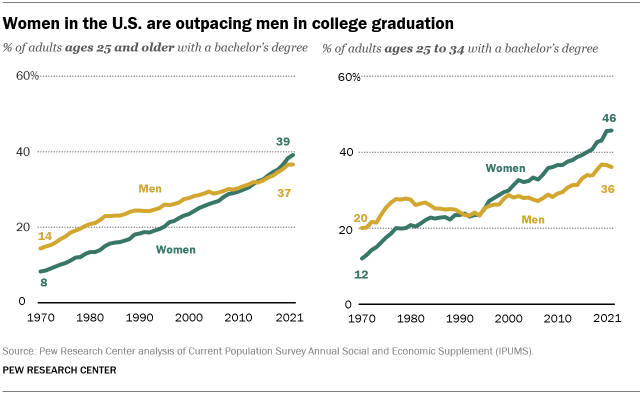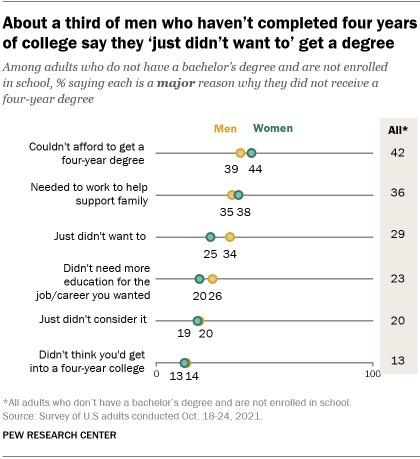The rising gender hole in increased schooling – each in enrollment and commencement charges – has been a subject of dialog and debate in current months. Younger girls usually tend to be enrolled in faculty right now than younger males, and amongst these ages 25 and older, girls are extra doubtless than males to have a four-year faculty diploma. The hole in faculty completion is even wider amongst youthful adults ages 25 to 34.

Girls’s instructional beneficial properties have occurred alongside their rising labor pressure participation in addition to structural adjustments within the financial system. The implications of the rising hole in instructional attainment for males are vital, as analysis has proven the robust correlation between faculty completion and lifelong earnings and wealth accumulation.
To discover the elements contributing to the rising gender hole in faculty completion, we surveyed 9,676 U.S. adults between Oct. 18-24, 2021. Everybody who took half is a member of Pew Analysis Heart’s American Developments Panel (ATP), a web based survey panel that’s recruited by way of nationwide, random sampling of residential addresses. This fashion practically all U.S. adults have an opportunity of choice. The survey is weighted to be consultant of the U.S. grownup inhabitants by gender, race, ethnicity, partisan affiliation, schooling and different classes. Learn extra concerning the ATP’s methodology.
Information on charges of school completion got here from a Heart evaluation of Present Inhabitants Survey Annual Social and Financial Complement (IPUMS). The onset of the COVID-19 pandemic impacted the information assortment for the 2020 ASEC. The response charge for the March 2020 survey was about 10 proportion factors decrease than in previous months. Utilizing administrative information, Census Bureau researchers have proven that nonresponding households had been much less much like respondents than in earlier years. Additionally they generated entropy stability weights to account for this nonrandom nonresponse. The 2020 ASEC figures offered used these supplementary weights.
Listed below are the questions used for this report, together with responses, and its methodology.
A majority (62%) of U.S. adults ages 25 and older don’t have a four-year faculty diploma, in accordance with a Pew Analysis Heart evaluation of Present Inhabitants Survey information. However the causes for not finishing a four-year diploma differ for women and men, in accordance with a brand new Heart survey of adults who wouldn’t have such a level and are usually not at the moment enrolled in faculty.

Monetary issues are a key purpose why many don’t attend or full faculty. Amongst adults who wouldn’t have a bachelor’s diploma and are usually not at the moment enrolled in class, roughly four-in-ten (42%) say a serious purpose why they haven’t acquired a four-year faculty diploma is that they couldn’t afford faculty. Some 36% say needing to work to assist help their household was a serious purpose they didn’t get their diploma.
General, about three-in-ten adults who didn’t full 4 years of school (29%) say a serious purpose for that is that they only didn’t need to, 23% say they didn’t want extra schooling for the job or profession they needed, and 20% say they only didn’t take into account getting a four-year diploma. Comparatively few (13%) adults with no bachelor’s diploma say a serious purpose they didn’t pursue this stage of schooling was that they didn’t suppose they’d get right into a four-year faculty.
Males are extra doubtless than girls to level to elements which have extra to do with private alternative. Roughly a 3rd (34%) of males with no bachelor’s diploma say a serious purpose they didn’t full faculty is that they only didn’t need to. Just one-in-four girls say the identical. Non-college-educated males are additionally extra doubtless than their feminine counterparts to say a serious purpose they don’t have a four-year diploma is that they didn’t want extra schooling for the job or profession they needed (26% of males say this vs. 20% of ladies).
Girls (44%) are extra doubtless than males (39%) to say not having the ability to afford faculty is a serious purpose they don’t have a bachelor’s diploma. Women and men are about equally prone to say needing to work to assist help their household was a serious obstacle.
The shares of women and men saying they didn’t take into account going to school or they didn’t suppose they’d get right into a four-year college are usually not considerably totally different.
The explanations folks give for not finishing faculty additionally differ throughout racial and ethnic teams. Amongst these with no bachelor’s diploma, Hispanic adults (52%) are extra doubtless than those that are White (39%) or Black (41%) to say a serious purpose they didn’t graduate from a four-year faculty is that they couldn’t afford it. Hispanic and Black adults with no four-year diploma are extra doubtless than their White counterparts to say needing to work to help their household was a serious purpose. There aren’t sufficient Asian adults with no bachelor’s diploma within the pattern to investigate this group individually.
Whereas a 3rd of White adults with no four-year diploma say not desirous to go to high school was a serious purpose they didn’t full a four-year diploma, smaller shares of Black (22%) and Hispanic (23%) adults say the identical. White adults are additionally extra prone to say not needing extra schooling for the job or profession they needed is a serious purpose why they don’t have a bachelor’s diploma.
In some cases, the gender gaps within the causes for not finishing faculty are extra pronounced amongst White adults than amongst Black or Hispanic adults. About four-in-ten White males who didn’t full 4 years of school (39%) say a serious purpose for that is that they only didn’t need to. This compares with 27% of White girls with no diploma. Views on this don’t differ considerably by gender for Black or Hispanic adults.
Equally, whereas three-in-ten White males with no faculty diploma say a serious purpose they didn’t full faculty is that they didn’t want extra schooling for the job or profession they needed, solely 24% of White girls say the identical. Amongst Black and Hispanic non-college graduates, roughly comparable shares of women and men say this was a serious purpose.
Amongst faculty graduates, women and men have comparable views on the worth of their diploma
those that have graduated from faculty, women and men are equally prone to see worth within the expertise. General, 49% of four-year faculty graduates say their faculty schooling was extraordinarily helpful by way of serving to them develop personally and intellectually. Roughly equal shares of males (47%) and girls (50%) specific this view.
Some 44% of school graduates – together with 45% of males and 43% of ladies – say their faculty schooling was extraordinarily helpful to them in opening doorways to job alternatives. A considerably smaller share of bachelor’s diploma holders (38%) say faculty was extraordinarily helpful in serving to them develop particular expertise and data that could possibly be used within the office (38% of males and 40% of ladies say this).
There are variations by age on every of this stuff, as youthful faculty graduates are much less doubtless than older ones to see worth of their faculty schooling. For instance, solely a 3rd of school graduates youthful than 50, in contrast with 45% of these 50 and older, say their faculty expertise was extraordinarily helpful in serving to them develop expertise and data that could possibly be used within the office.
Notice: Listed below are the questions used for this report, together with responses, and its methodology.






























































